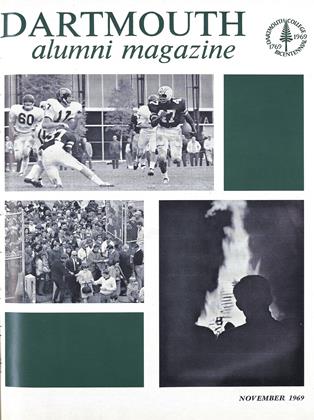DR. BOWDLER'S LEGACY. A HISTORY OF EXPURGATED BOOKS IN ENGLAND AND AMERICA.
NOVEMBER 1969 ROBERT G. HUNTERDR. BOWDLER'S LEGACY. A HISTORY OF EXPURGATED BOOKS IN ENGLAND AND AMERICA. ROBERT G. HUNTER NOVEMBER 1969
.By Prof.Noel Perrin (Department of English). NewYork: Athenaeum. 296 pp. $7.95.
Dirty words: belly, stink, guts, grunt, unbuttoning. Coarse, low, vulgar syllables, all suggestive of the commonness of our common humanity and all removed by various Victorian editors from Shakespeare and the English Bible. Noel Perrin has investigated this curious nineteenth (and late-eighteenth and early-twentieth) century mania for castrating the literature of the past. The result is a delightful book - funny, of course, because Professor Perrin is a very witty man and his subject is a richly ridiculous episode in the history of our culture, but also humane because the author has made the imaginative effort needed to understand the impulses behind Bowdlerism. He has seen how the vogue for sensibility could lead to the curious belief "that delicacy is, like virginity, something that you can only lose once, and that you can never recover." If you equate delicacy with innocence and innocence with ignorance and if you make of innocence the highest human virtue, then you must defend innocence from deflowering knowledge, from contact even with the suggested image of anything vulgar or low. So out of literature go belly, stink, guts, etc., etc., and above all, out goes sex, that low, indelicate activity.
The taboos of a period work successfully on the literature produced in that period, and they worked so successfully upon the postry and fiction of the great Victorians that the blessedly uninformed can read most of the verse and novels of the later nineteenth-century without discovering that such a thing as sexual intercourse exists. But what about the literature of the past? It posed a problem. "If I had my way with these classic books, I would blot them from the face of the earth." (Sidney Lanier on the eighteenth-century novel.) Such heroic methods were impractical, however, and Bowdlerism, the rewriting of those classic books, represented the best available compromise.
In tracing Bowdlerism's history, Professor Perrin supports his wit and understanding with an exemplory scholarship which has unearthed and assembled a great many good stories. For example, one finds among the unlooked-for results Of the promotion of verbal innocence, the following stanza from a Victorian masterpiece, Browning's PippaPasses:
Then, owls and bats Cowls and twats Monks and nuns, in a cloister's moods, Adjourn to the oak-stump pantry.
Dr. Bowdler's Legacy would be worth reading just for the hilarious history of how those lines came to be written.
Mr. Hunter is Associate Professor of English, Dartmouth College.
 View Full Issue
View Full Issue
More From This Issue
-
 Feature
FeatureBlack Studies: A Beginning
November 1969 By SUSAN LIDDICOAT -
 Feature
FeatureThe Most Dangerous Gap of All
November 1969 By THOMAS J. McINTYRE '37 -
 Feature
FeatureThe Dean Charts a Course
November 1969 -
 Feature
FeatureA Conclave of Noted Scientists
November 1969 -
 Feature
FeatureCOED EXCHANGE
November 1969 -
 Article
ArticleWith the Big Green Teams
November 1969
ROBERT G. HUNTER
Books
-
 Books
Booksshelf life
Mar/Apr 2002 -
 Books
BooksTHE EAGLE AND THE BEAR
July 1950 By Francis W. Gramlich -
 Books
BooksFRANCE 1940-1942, A COLLECTION OF DOCUMENTS AND BIBLIOGRAPHY.
November 1942 By Frank Maloy Anderson -
 Books
BooksTORO! TORO! TORO!
December 1974 By J.D.O'HARA '53 -
 Books
BooksE. E. CUMMINGS.
JULY 1964 By THOMAS VANCE -
 Books
BooksMisused Decades
April 1980 By Walter W. Arndt




